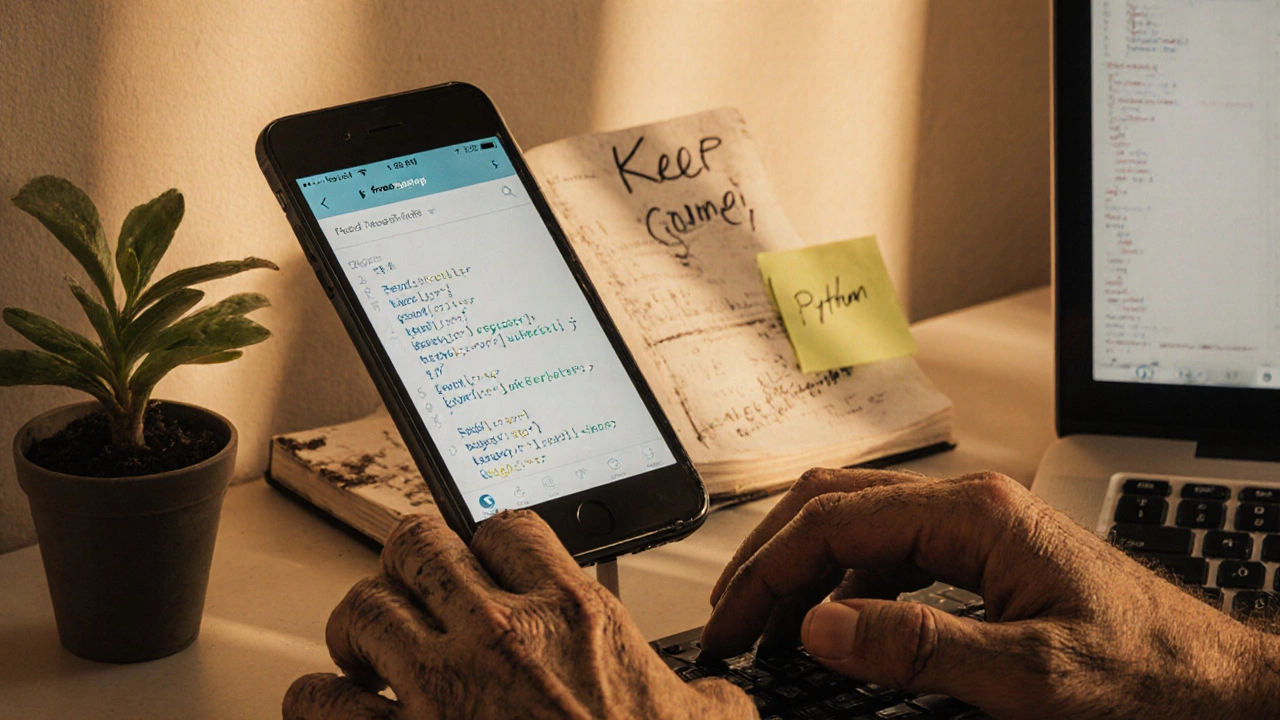
Is coding a good career in 2025? Real pros, cons, and what actually matters
Coding Career Fit Assessment
This assessment evaluates whether coding is a good fit for you based on key traits discussed in the article. Answer honestly to get your personalized results.
Your Coding Career Fit Assessment
Based on your responses
Is coding a good career? If you’re asking this question, you’ve probably seen the headlines: "Code your way to $120,000!" or "No degree? No problem!" But real life doesn’t look like a TikTok ad. Some people thrive in tech. Others burn out by year two. The truth isn’t about whether coding is "good"-it’s about whether it’s right for you.
What coding jobs actually look like today
Most people think coding means sitting alone in a dark room typing lines of Python. That’s not the full picture. Today’s developers spend about 30% of their time writing code. The rest? Debugging broken systems, explaining tech to non-tech coworkers, attending meetings about priorities that keep changing, and documenting stuff no one reads.
Entry-level roles-like junior frontend developer or junior backend engineer-usually involve fixing small bugs, updating old code, and learning from seniors. You won’t be building the next Instagram. You’ll be fixing a button that doesn’t work on Safari. It’s tedious. It’s necessary. And it’s how you learn.
Mid-level developers start owning features. Maybe you’re in charge of the checkout flow on an e-commerce site. That means you work with designers, QA testers, product managers, and customer support. You need to speak their language. You need to say "no" when a request won’t work. You need to explain why a change will take three days instead of three hours.
Senior roles? They’re less about typing and more about guiding teams, choosing tools, and preventing disasters. If your code crashes during Black Friday, you’re the one on the call at 3 a.m. That’s the reality. Not all coding jobs are glamorous. But they’re all in demand.
Why coding pays well-when it does
Salaries vary wildly. In the UK, a junior developer earns between £28,000 and £40,000. Mid-level? £45,000 to £65,000. Senior roles in London or remote roles for US companies can hit £80,000+. But those numbers don’t mean much if you’re in a small town with no tech scene.
Here’s what drives pay: specialization. Developers who know how to handle cloud infrastructure (like AWS or Azure), security, or AI/ML tools earn more. Generalists who just know HTML and JavaScript? They’re competing with freelancers in countries where the cost of living is lower. You can still make good money-but you’ll need to stand out.
Companies in finance, healthcare, and government pay more than startups. But startups offer equity. That’s a gamble. Most startups fail. A few make their employees millionaires. Most just pay slightly above average and expect 60-hour weeks.
The hidden costs of being a coder
Coding isn’t just about learning a language. It’s about learning constantly. Frameworks change. Tools get replaced. Libraries get deprecated. If you learned React in 2020, you’re already behind. Today’s market wants React 19, Next.js 15, and TypeScript with strict mode enabled.
You’ll spend your evenings and weekends learning. Not because you want to. Because you have to. If you stop learning for six months, you’ll fall behind. That’s exhausting. And it’s not just technical skills. You need to understand agile sprints, Jira tickets, git branching, and code reviews. That’s a whole second job.
And then there’s the mental load. Debugging can feel like solving a puzzle where half the pieces are missing. You’ll stare at the same error for hours. You’ll feel stupid. You’ll doubt yourself. That’s normal. But if you don’t enjoy the process of figuring things out, you’ll hate the job.

Who thrives in coding? Who doesn’t?
People who do well in coding are usually:
- Comfortable with uncertainty-you won’t always know the answer, and that’s okay
- Persistent-they don’t quit when something breaks
- Detail-oriented-missing one semicolon can crash a whole app
- Good communicators-you’re not coding in a vacuum
People who struggle:
- Want quick results-coding is slow, repetitive, and rarely dramatic
- Dislike problem-solving for its own sake-if you only like coding because it pays well, you’ll burn out
- Get frustrated easily-mistakes are constant. If you take them personally, it’ll crush you
- Prefer human interaction over screens-most of your day is spent talking to computers, not people
There’s no single personality type that fits. But if you’re the kind of person who enjoys tinkering, fixing broken things, and figuring out how stuff works-you’ll probably like it.
How to start without going broke
You don’t need a degree. You don’t need to spend £10,000 on a bootcamp. You don’t even need a fancy laptop.
Start with free resources: freeCodeCamp, The Odin Project, or the BBC’s introductory Python course. Build one small project. A to-do list app. A weather checker. A site that shows you the next bus time. Then put it on GitHub. That’s your portfolio.
Apply for internships or junior roles even if you don’t feel ready. Most companies expect you to learn on the job. Your first job won’t be perfect. But it’ll be your foot in the door.
Don’t chase the "best" language. Learn JavaScript if you want frontend work. Learn Python or Java if you want backend or data roles. Learn SQL-it’s everywhere. Pick one. Master it. Then learn another.

Is coding a good career? Here’s the real answer
Coding is a good career if:
- You like solving puzzles for hours
- You’re okay with constant learning
- You don’t mind sitting in front of a screen most of the day
- You want stability, decent pay, and remote options
Coding is not a good career if:
- You think it’s a shortcut to riches
- You hate being stuck on problems
- You expect praise for every line of code you write
- You’re looking for a creative job where every day feels like art
The tech industry isn’t dying. It’s maturing. Jobs are still plentiful. But the days of "learn React in 30 days and get hired" are over. You need depth. You need patience. You need grit.
If you’re willing to put in the work, coding can give you freedom-remote work, good pay, and the chance to build things that matter. But it’s not magic. It’s a trade. And like any trade, you have to earn it.
What to do next if you’re serious
Here’s a simple 90-day plan:
- Week 1-4: Pick one language (JavaScript or Python). Complete one free course. Build a simple app.
- Week 5-8: Learn how to use Git and GitHub. Push your code online. Write a short README explaining what it does.
- Week 9-12: Apply to 10 junior roles or internships. Don’t wait until you feel "ready." Most people get hired before they think they’re qualified.
That’s it. No bootcamp. No debt. Just action.
Do I need a degree to get a coding job?
No. Most companies in the UK now hire based on skills, not degrees. You’ll need a portfolio of projects, a GitHub profile, and the ability to solve coding challenges. Some larger firms still ask for degrees, but they’re becoming the exception, not the rule.
Can I learn to code at 30, 40, or older?
Absolutely. Many developers switch careers in their 30s and 40s. Age isn’t a barrier-attitude is. If you’re willing to learn, adapt, and put in the hours, you’ll find opportunities. Employers care more about your ability to solve problems than your birth year.
Is there a shortage of coders in the UK?
There’s no shortage of people who say they can code. But there is a shortage of people who can code well, reliably, and at scale. Companies struggle to find developers who understand testing, debugging, collaboration, and clean code-not just who can copy-paste from Stack Overflow.
How long does it take to get a coding job?
It varies. Some people land jobs in 3-6 months with consistent effort. Others take over a year. It depends on how much time you can dedicate, how focused you are, and whether you build real projects-not just tutorials. The key is not speed, but proof: your code on GitHub, your ability to explain it, and your willingness to learn from feedback.
What’s the burnout rate in tech?
Studies show around 30-40% of developers consider leaving tech within five years. Burnout comes from constant change, long hours, and pressure to deliver. It’s not the coding itself-it’s the culture in some companies. The fix? Find teams that value balance, clear expectations, and mental health. Not every company treats devs like machines.
Final thought: It’s not about coding. It’s about thinking.
Coding is just the tool. What matters is how you think. Can you break big problems into small pieces? Can you stay calm when something breaks? Can you keep going when you’re stuck? If yes, then coding can be a great path. If not, you’ll find better ways to spend your time.






Write a comment